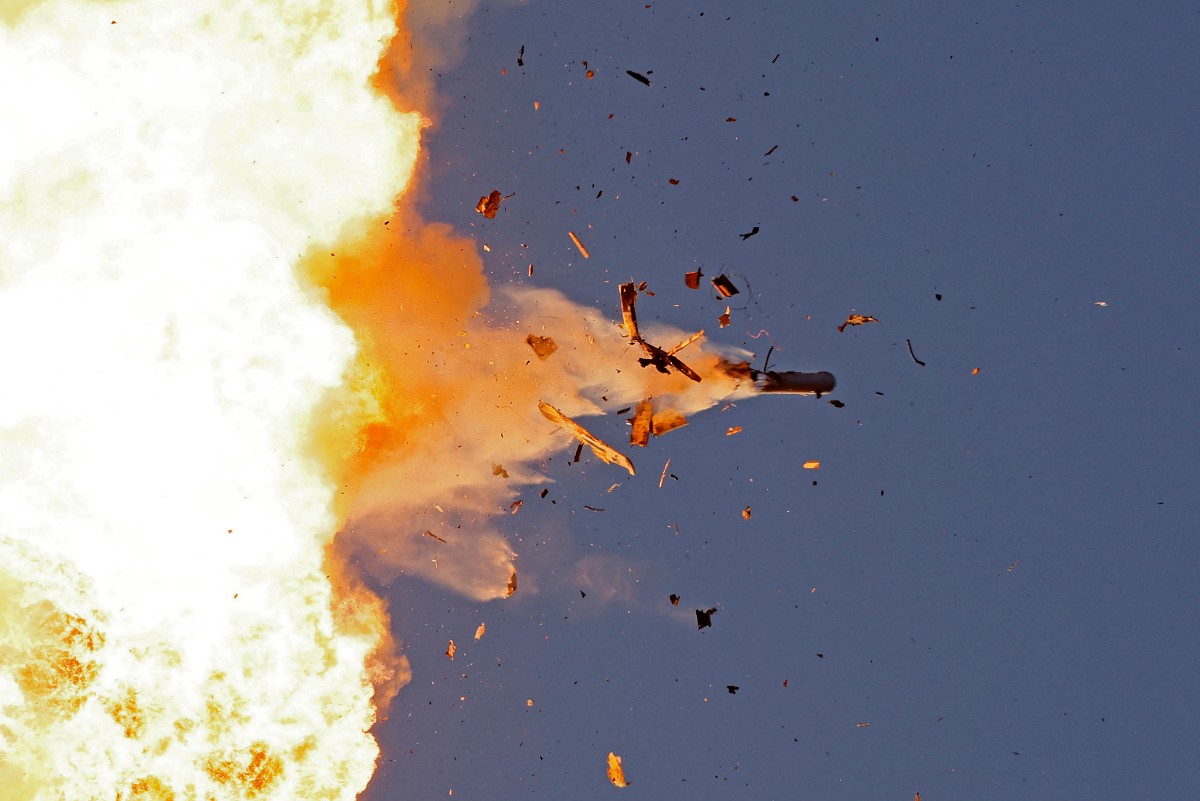State of emergency declared as Hezbollah launches 320 rockets, drones against Israel
Hezbollah said it had carried out a large-scale attack with rockets and drones on Israeli positions on Sunday in an “initial response” to a top commander’s killing, as Israel launched what it called pre-emptive strikes against the group. “The number of Katyusha rockets launched until now is more than 320… towards enemy positions,” a Hezbollah […]

This photo taken from a position in northern Israel shows a Hezbollah UAV intercepted by Israeli air forces over north Israel on August 25, 2024. (Photo by Jalaa MAREY / AFP)
Hezbollah said it had carried out a large-scale attack with rockets and drones on Israeli positions on Sunday in an “initial response” to a top commander’s killing, as Israel launched what it called pre-emptive strikes against the group.
“The number of Katyusha rockets launched until now is more than 320… towards enemy positions,” a Hezbollah statement said, adding it had targeted 11 Israeli bases and barracks, including on the annexed Golan Heights.
It had earlier also said it “began an air attack with a large number of drones” targeting deep into Israel.
The Iran-backed movement has exchanged regular fire with Israel in support of its ally Hamas since the Palestinian militant group’s October 7 attack on Israel sparked the Gaza war.
- Catholic bishops: Nigeria sitting on time bomb
- Sarkin Gobir murder: 18 youth associations to drag Sokoto gov’t to ICC
But fears of full-blown conflict grew after Iran and Hezbollah vowed revenge for the killing last month, blamed on Israel, of Hamas leader Ismail Haniyeh in Tehran, and an Israeli strike that killed Fuad Shukr, a top Hezbollah commander, in south Beirut.
The Lebanese movement said its attack came in an “Initial response” to Shukr’s killing.
The “First phase has ended with total success”, the group said, adding that this phase sought to “Target Israeli barracks and positions to facilitate the passage of attack drones towards targets” deep inside Israel.
There was no immediate confirmation from the Israeli military.
Hezbollah also said it was “In a high state of readiness”, adding that “If civilians are harmed, there will be very severe punishment”.
Lebanon’s official National News Agency reported Israeli strikes on a large number of locations in south Lebanon.
Beirut’s international airport was working normally.
The cross-border violence since October has killed more than 600 people in Lebanon, mostly Hezbollah fighters but including at least 131 civilians, according to an AFP tally.
On the Israeli side, authorities have announced the deaths of at least 23 soldiers and 26 civilians, including in the annexed Golan Heights.
Defence Minister Yoav Gallant announced a 48-hour nationwide state of emergency from 06:00 am (0300 GMT) Sunday, after the Israeli military launched what it called pre-emptive strikes in Lebanon.
“The declaration on the state of emergency enables the IDF (Israeli military) to issue instructions to the citizens of Israel, including limiting gatherings and closing sites where it may be relevant,” Gallant said, in a statement issued by his office.
“I am convinced that there is a high probability of an attack against the civilian population in areas of the country where the declaration of a special situation did not apply,” he said, referring to previous local emergency measures.
“I hereby declare a special situation on the home front in other areas of the country. The situation is valid for 48 hours starting at 6:00 am,” Gallant said.
In a separate statement, the defence ministry said Gallant briefed US Secretary of Defence Lloyd Austin on the overall situation.
“We have conducted precise strikes in Lebanon in order to thwart an imminent threat against the citizens of Israel,” Gallant told Austin, according to the statement.
“We are closely following developments in Beirut, and we are determined to use all the means at our disposal in order to defend our citizens.”
The statement also said that the two leaders “discussed the importance of avoiding regional escalation”.
